Grant Writing: How To Write A Grant Proposal Step-by-Step
Never let anything stop you from realizing your goal of writing a grant. This complimentary training will help you to understand the basics of what you need to do to learn how to write a grant proposal with step-by-step instructions. You will also discover the steps you can take to become a grant writer.
- Steps To Writing The Grant Proposal
- A Good Proposal Versus Bad Proposal
- The Different Sections Of A Grant Proposal
- A Team Approach To Grant Writing
- How to Write a Proposal and Get What You Want
- The Old Way Versus The New Way
- Steps To Becoming A Grant Writer
Rodney Walker: Hello and welcome to the Grant Writing training. I will share with you how to write a grant proposal step by step. I want to encourage you to dial-in and to really focus and to remove all distractions because I have some valuable information to share with you and our time today.
So with that said, who is this for? This is for anyone interested in learning the fundamentals of writing a grant proposal and the practical steps required to becoming a grant writer.
What will you learn? You'll learn the following.
What is a grant proposal?
What goes in a grant proposal?
What makes a good versus bad grant proposal?
How to review a grant proposal application as well as some best practices in grant writing and trends.
I'm going to be sharing with you the old versus the new way to write grants and the steps to becoming a grant writer. Will also explore some case studies and much more.
With that said, let's fasten your seat belt and get ready for a great ride.
Hi, I'm Rodney Walker, the founding president of Grant Center USA, Grant Writers Association and The Get Funded Inner Circle. I'm a leading expert in grant development systems and have created numerous products and trainings to help people be successful in their grant development. I've also taught at Regent University, Cal Poly, Hawaii University, and numerous others.
With that being said, I've had the opportunity to connect with many who are at the top of their games. These are champions in their industry. And with that said, today, I'm excited about helping you to become a champion with getting funded.
Steps To Writing The Grant Proposal
So what goes inside of a grant proposal? Well, a grant proposal has a number of things that goes inside of it. But first, we've got to know what is a grant proposal. And a grant proposal is a clear and concise presentation of what you're proposing to do before it actually happens. That's the long and short of it.
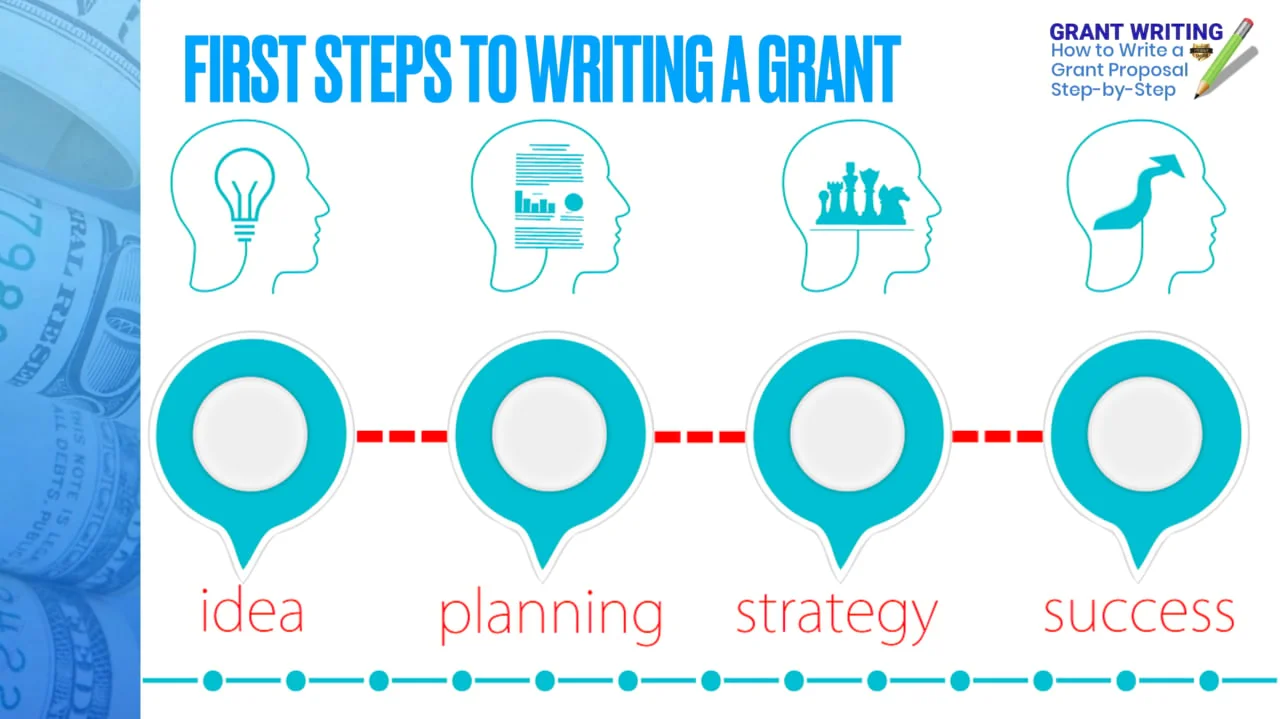
So we're going to look at the steps required to actually developing one. The first step to writing a grant proposal always starts with an idea. What is the idea that you are hoping to bring into fruition? Maybe your organization has a program that it has been doing and now you're seeking additional funding to help bring that into reality. With that being the case, you and your organization will be required to do some planning to flesh out the details of what your program is or what your initiative is about, that you're seeking funding for.
This calls for you to go to the next phase, which is the strategy phase. Where are you going to have to detail your approach and your strategy to actually implementing that program or initiative, when you do all of those things that eventually will lead you to success. And what we're working toward with our grant proposal is to have a well-thought-out game plan of what it is that you're proposing to do so that the funder will in turn give you funds to implement that project.
Now, the second step in writing a grant proposal includes the following. And I want to make sure that you pay careful attention to what I'm about to say now. The first thing is that you want to make sure that you should be writing a grant proposal in the first place. I say this because a lot of people are writing grant proposals for things that cannot get funded. And we want to make sure that you are not wasting your time.
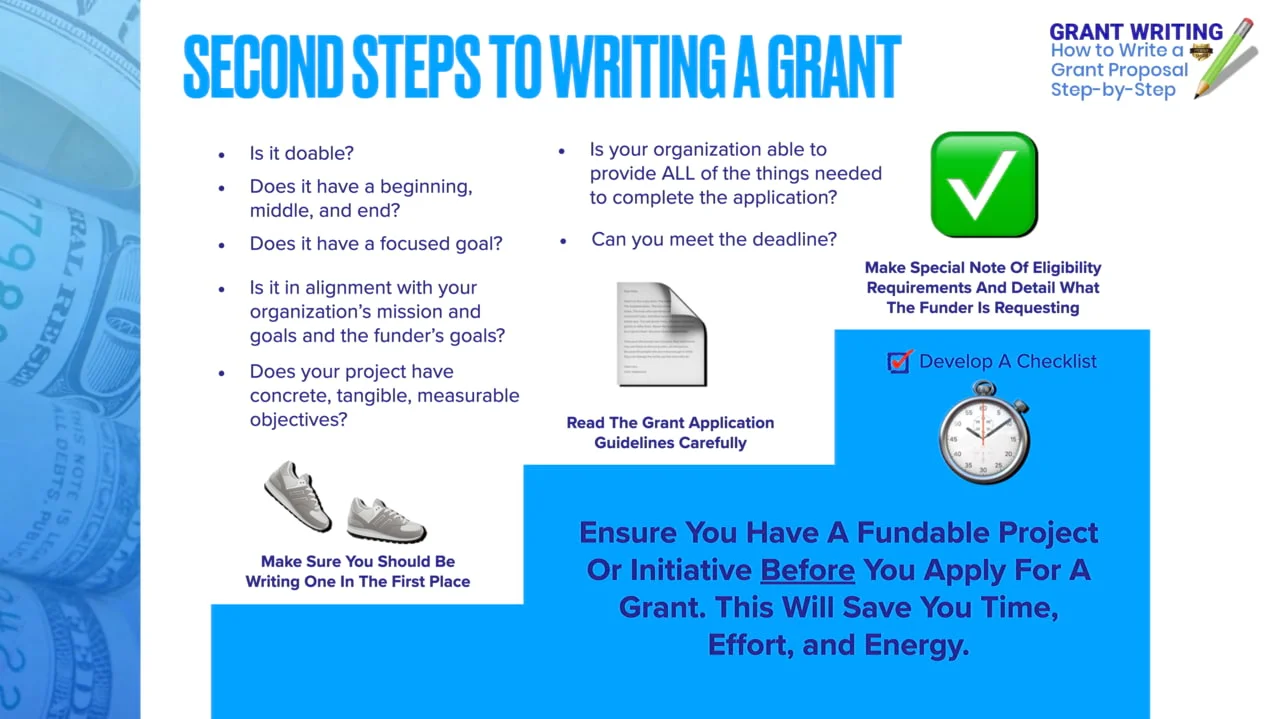
The second thing that I want to encourage you to do is to read the grant application guidelines carefully. This will help you to know if you actually qualify to get funded from a potential funder. So make special note of the eligibility requirements and detail what the funder is requesting. When you do this, this will ensure that you have a fundable project or initiative before you apply for a grant, and this will save you time, energy and effort.
I'm speaking from experience because the very first time that I applied for a grant proposal, I actually applied for something that I did not qualify for and it was a major waste of time. I decided to do things a much smarter way, and when I learned the smarter way, I realized that I should have been doing the things that I'm sharing with you to do right now.
How do we make sure that we actually can qualify? You want to make sure that your project is first doable and you want to ask yourself, does it have a beginning, a middle, and an end? Because funders are not funding forever projects. They're funding a project typically for one year if it's a foundation proposal and if it's a government proposal, they may fund multiple years. But most private funding is going to be for one year. So it needs to have a beginning, a middle, and an end.
You want to ask yourself, "Does it have a focused goal?" and "Is it in alignment with the organization's mission and goals and the funders' goals?" Because there is a marriage going on? This is a proposal of what you're proposing to do. You want to ask yourself, "Does your project have concrete, tangible, measurable objectives?" If it can't be measured and if it's not concrete, if it's vague, you will not get funded.
So you don't want to waste your time, you want to make sure that you have something that's solid. You also want to ask yourself, "Is your organization able to provide all of the things needed to complete the application?" If you can't provide all of the information, you're placing yourself in a position not to get funded.
You don't want to waste your time. Again, you want to make sure that you can meet the deadline. Every grant proposal will have a deadline. And that's why you want to make sure that you develop a checklist so that you can meet the deadline. You, in essence, are budgeting your time.
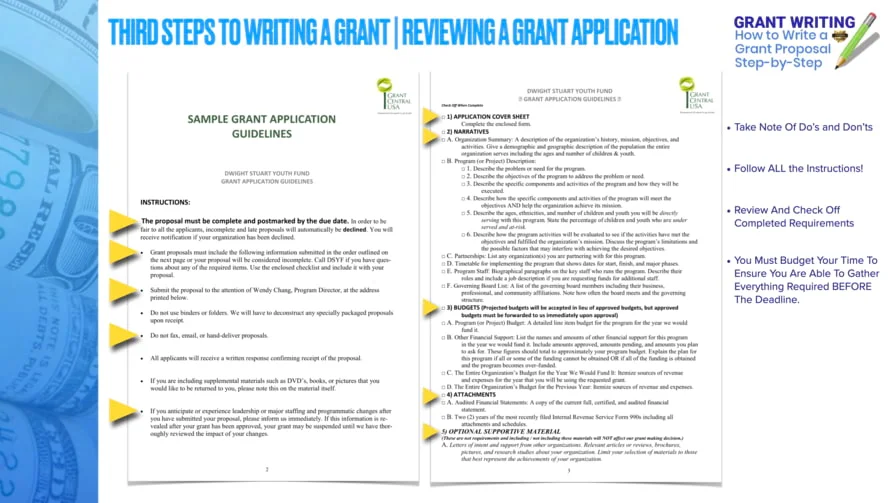
So let's take a look right now at the third step to writing a grant. We're going to review an actual grant proposal. Now, this proposal is from the Dwight Stuart Youth Fund and here are the guidelines that you will oftentimes find on a funder's website. They will detail and say this is what you need to do in order to apply for our potential grant. And it doesn't mean that you're going to get funded, but if you follow these steps, you increase your likelihood of actually getting funded.
Here are some things I want to encourage you to do. First, take note of the dos and don'ts. Each of these guidelines will have a number of things that they will want you to do and things that they will not want you to do. And we're going to be highlighting some of those in this application that are going to be reviewing today. Also, follow all of the instructions. I can't stress this enough.
The number one reason why most grants are not funded is because people do not follow the instructions. Next, review and checkoff completed requirements. You'll notice on the application on the right side that there are a number of checkoff boxes that you can checkoff. You want to do the same with whatever application you're doing.
Also, you must budget your time to ensure that you are able to gather all of the required documents before the deadline. That's why you want to give yourself plenty of time so that you're not in a rush situation.
So let's take a look at some things with this particular application. You'll notice that the proposal must be completed and postmarked by the due date. They have this in bold because this is so very important. And look at what they say. In order to be fair to all applicants, incomplete and lay proposals will automatically be denied. So we want to make sure that we are not in that category. Here's where I was sharing with you earlier about the dos and the don'ts.
Next, grant proposal must include the following information submitted in the order outlined on the next page. So, as you look on the right, you'll see they give you specific details of how they want you to present the information. You want to make sure that you followed these to a T, because if you don't, oftentimes funders will have someone to review your proposal. And if it's not in the order, you automatically get disqualified and we don't want you to be disqualified. So follow the instructions.
The next thing you'll notice, submit the proposal To. They share with you exactly who they want it to be submitted to. And then also notice that they don't want this to be coming across through an email and they don't want a fax. They don't even want you to come and hand-deliver. So some funders will allow these things, but this particular funder does not. So we want to make sure that we cater to each funder what they are specifically asking for.
Notice this next thing. If you anticipate our experience, leadership, or major staffing or programmatic changes, they want to know that immediately. So this is kind of giving you a feel of the interest that the funder actually has. Now, this is going to vary from funder to funder, but some of the things that you've seen here are going to be typical of other funders.
If you look at this application, you'll notice the first thing in this one, they want you to have a cover sheet with this application. Then next is the narrative. This is where you typically will tell about your organization. You're summarizing. You'll also talk about your project, the programs that you have, the need, why this program is needed now. Who's is it going to help? Who's going to benefit? What are the activities that you'll be doing? The timeline, the staffing. You'll be sharing information about the governing board and more.
Also, you'll notice another very important section is the budget. This is where you will detail how you're going to spend them funds that the funder is going to provide for you to be able to carry out this project. They also want to know information about your organization's budget, but they want to know about your program budget that is for this specific project that you'll be doing. Both of those are critical information that most funders will want to know.
You also notice that this particular application has another section called Attachments, and this is where you provide additional support of materials such as audits of your financial statements and different information, such as your 990 form. Remember, we want to make sure that we gather everything and present a complete message.
A Good Proposal Versus Bad Proposal
Now, with that being said, let's move on and take a look at some other things about what makes a good proposal versus a bad proposal. So can you guess what makes a good proposal? Well, let me share a few things with you. And this is our fourth step to writing a grant proposal.
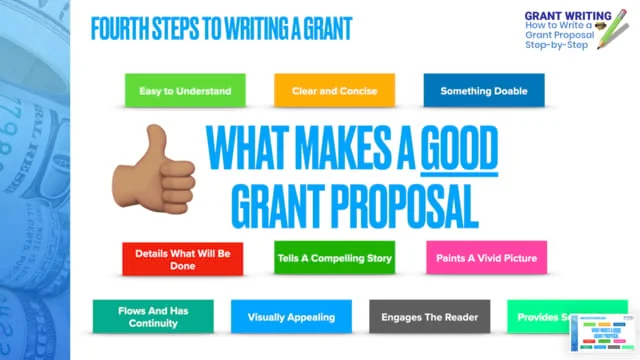
We want to make sure that we have a proposal that is easy to understand. We're not striving to be sophisticated and very complex. We're striving to be understandable. We also want this to be clear and concise. We don't have to go on forever and ever, get to the point. It should be something that is doable, meaning that it can actually be done in the timeframe that you've specified. It also needs to detail what will be done, when it will be done, and how it will be done. It needs to tell a compelling story. What led up to your organization going in this particular direction and what are some of the benefits that the community are those who are going to be on the receiving end of this grant will experience.
You need to paint a vivid picture that brings to life what you're proposing to do, and it also needs to flow and have continuity. We want to make sure that if this is a paper proposal that is being submitted to the funder instead of an online application, we want to make sure that is visually appealing.
And finally, as we look at a couple of things here, we want to make sure that it engages the reader and that it provides social proof. Proof that what you're proposing to do can actually happen and that you've actually been doing some things before you actually apply. This will help you to make a good grant proposal.
Now, what makes a bad grant proposal? Well, a proposal that lacks clarity is definitely categorized as a proposal that will fall into the bad category. We want to make sure that we provide excellent clarity so that the funder knows exactly what we're proposing to do. A proposal that is loaded with errors also lacks credibility because the funder will begin to think that if you can't take care of some of these minor errors in your proposal, how will you treat the money that they provide for you? Anything that is unrealistic expectations of what you proposing also places you into a less favorable category. And when you have no clear outcomes of what you're striving for to achieve that also does not help you in your calls of getting funded.
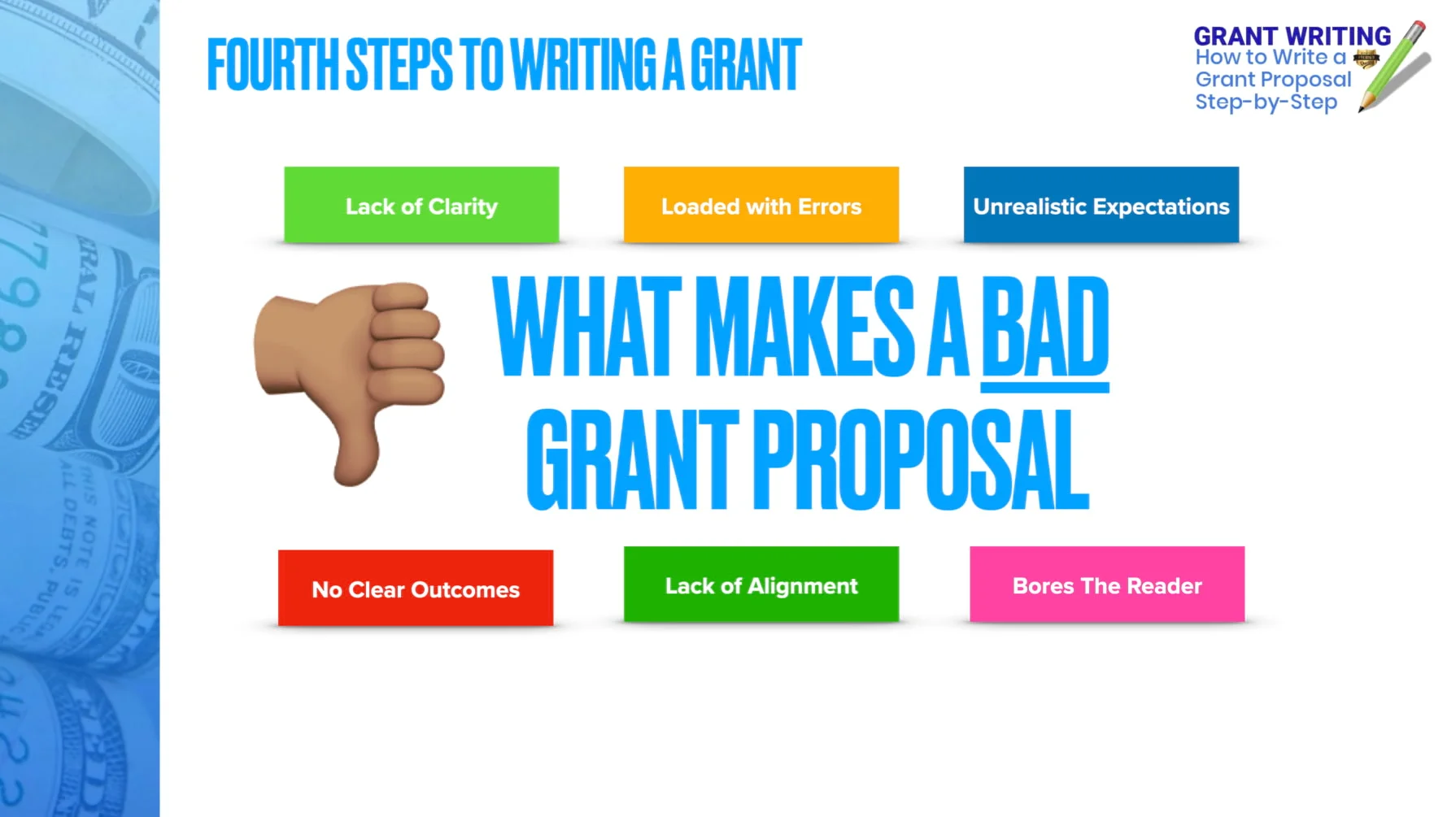
It needs to be in alignment with what the funder is wanting to do and how the funder is wanting to see the world. So it has to have alignment. If your proposal lacks alignment, meaning that your organization is about this and the funders about this. If those two don't match, you're placing yourself in a less favorable position. And the final thing that helps to make a proposal bad is that it bores the reader.
We don't want to bore the reader because that does not help our cause of getting funded. We want to have a project, a proposal that is exciting, that helps the reader to envision a brighter future and your organization, and what you're proposing to do is one part of that solution. But that said, let's move on so that we can make sure that we write a good proposal.
The Different Sections Of A Grant Proposal
So what goes inside of a grant proposal? Here are the different sections. Do you have a cover sheet and a table of content, typically. You'll also have an executive summary that typically is one page long. You'll also have a statement of need. This tends to be about two pages long and you will have a project description that typically is three pages.
You will have a budget that typically is one page and organizational information that's typically about one page and then a conclusion that's about two paragraphs long. Finally, you have the appendix and supporting materials. Now, the information that I've shared with you here is what would typically go inside of a private or what is called a foundation grant proposal. When you're dealing with a government grant proposal, also known as a public grant, those proposals can be much longer and a few other changes will be there.
For instance, the budget will not only include a one page document, but it will also include you detailing line for line and a budget narrative, what is actually being spent, and why. And it details what that line item is about. So those are some of the minor differences between those two, the government proposal versus a proposal that's been submitted to a private foundation. What we want to make sure that we do is that we give the funder what they ask for in an organized and well-thought-out proposal, because this will increase our chances of getting funded and we don't want to waste time.
Another very important section is the fifth step with writing a grant, and that is the smart goals and objectives. This part is going to be important because as we saw earlier as we reviewed the application guidelines, most funders want you to detail why you're doing what you're doing and what are the outcomes.
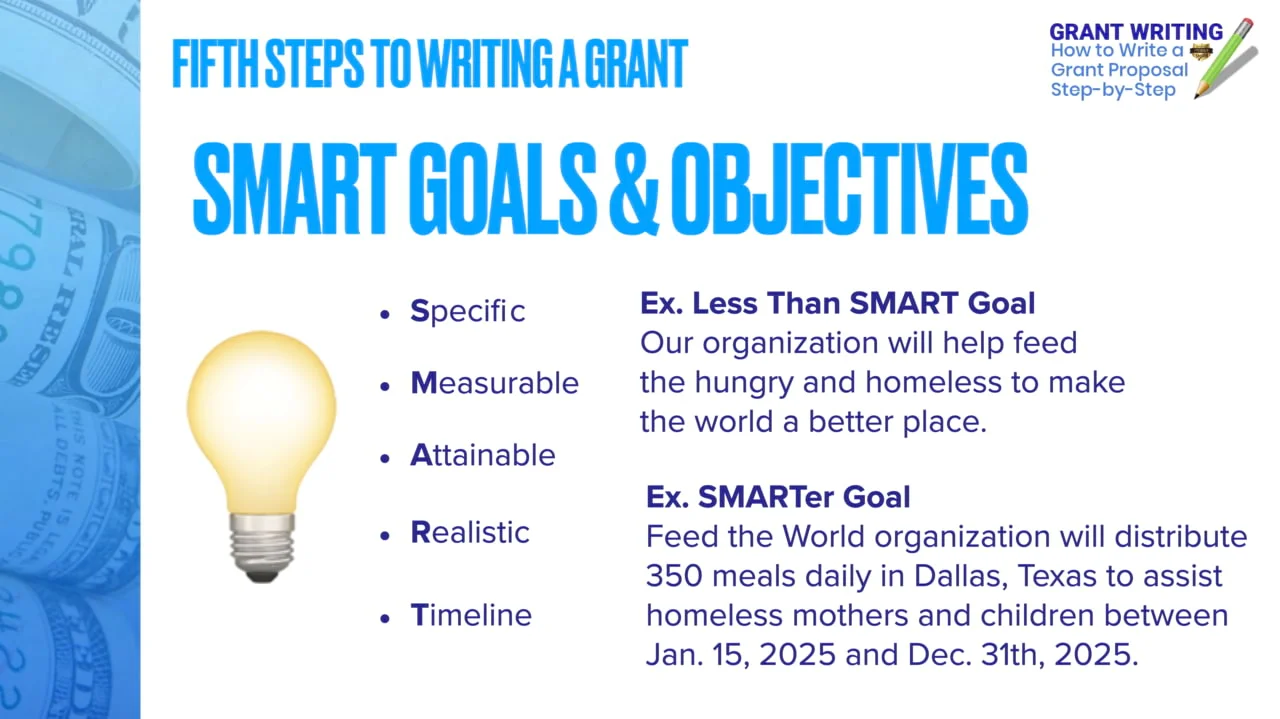
That means that we have to have smart goals and objectives. With that being said, SMART is an acronym that stands for specific, measurable, attainable, realistic, and it has a timeline. Now, let me share with you a sample of a less than SMART goal. If someone said our goal is our organization will help feed the hungry and homeless to make the world a better place.
I want to share with you why this goal is not considered a SMART goal. Who is the organization? We don't know. We know that they're going to help to feed the hungry and homeless but where is this going to take place, and when is it going to take place, and how is it going to take place? To make the world a better place is kind of nebulous. It's very vague. So this one goal, an objective that we have here, is something that is lacking clarity. And that's why we want to make sure that we have a SMART goal or at least a SMARTer goal.
Here's a sample of a smarter goal.
Feed the World Organization, so that's the name of the organization, will distribute 350 meals daily in Dallas, Texas. So we know the where now. We know what they're going to provide 350 meals to assist homeless mothers and children between January the 15th 2025 and December the 31st 2025. So the goal now has become SMARTer. As you are working on your proposal, I would encourage you to write SMART goals.
Another thing that is going to be important for you to note as you're writing your grant proposal are some of today's best practices. And I want to share with you seven grant writing best practices that you definitely want to follow. First, I want to encourage you to develop a grant writing game plan, a game plan of where you're headed with your proposal. We don't want to just dive into this effort without knowing exactly what we're doing. We want to have some mode of operation. And the game plan of what we're going to do helps us to get there.
A Team Approach To Grant Writing
A part of your game plan right now is learning how to actually write a grant proposal in an effective way.
The next thing may be for you to get a team, use a team approach to grant writing because when you're writing grants as a team, it's more effective. Even if you're a solo grant writer, a part of your team should include others that review your proposal. You may have someone that's on your team that's actually an editor.
And these can be people that are outside of your own organization. Some that you may have to subcontract to pay to do some of these services. But my encouragement is to get a team because when you start getting the brainpower of more people, your proposals tend to be better.
Also, read everything before you write anything as it relates to your proposal.
This will save you time and heartache. Trust me, I've been there. I'm speaking out of experience. Also, it should include an evaluation in your grant proposal. Every grant proposal that you write needs to have something that clarifies how you're planning on evaluating your proposal. And by the proposal, I'm speaking of that which you are proposing to do, how you evaluate the project that you've just received funds for and who's going to do that evaluation and how are they going to evaluate it?
And is it going to be done by an external person or is that going to be done by somebody internally? Bottom line is funders look at you doing evaluations as something very favorable. So I would encourage you to make sure that you do that.
In addition to that, if it is a proposal that will allow you to, I'm a big fan of using pictures, charts and graphs. This helps your proposal to come to light. Now, you may not be able to do this if you're doing an online application, because they will have oftentimes just something that allows you to put the text in. That means you will have to make sure that you do an excellent job of creating work pictures that help to come to life and paint a picture for the funder.
In addition to that, I want to encourage you to provide relevant up to date information. You never know who's at the table that's reviewing your proposal, that has the updated information. If you're providing outdated information, it begins to make your organization look less than up to date and kind of dated. And we don't want to come across as dated. We want to come across as an organization that's on the cutting edge of doing something great.
How to Write a Proposal and Get What You Want
And the seventh thing is to give the funder 100% of what they request. Have I said this enough? I hope that you're getting the point that you must follow the instructions and give the funder what they want. We want to be providers instead of people who are just shoving what we want on the funder. Some might to just be a pusher of their information versus being a provider. We want to be providers. But that being said, every proposal that you going to write is going to be discussing the who, what, when, where, how, and why. And almost every section of the proposal will be highlighting these key points. So do a great job of fleshing out your story and telling the best story you absolutely can.
Now, let's talk about the old way of doing grant writing versus a new way and also the old way of what keeps people from being as successful as possible. The first thing I want encourage you to do is read the guidelines, but not just read the guidelines because they're always just reading the guidelines and simply applying. And we don't want to just do that.
A lot of times we put ourselves behind the eight ball when we just read the guidelines and simply apply. I'm going to be sharing with you a more comprehensive strategy. Also, the old way is simply aimlessly sending several grant proposals to as many funders as possible hoping that you get funded. The old way is trying to learn grant write in the same way you saw your agency or other staff members addressing this issue. That's why I'm so happy that you're here right now learning this information. The always telling prospective funders what you want and thinking that that's enough today.
You've got to be more sophisticated in your approach. And it's also thinking that your grant proposal is the only thing that's influencing the decisions maker's approval. Trust me, my friend, I talked to several funders all the time. And one thing that I've heard repeatedly from them is, is that they're looking at more than just your grant proposal. Now, the old way it's just like that suit that you saw on the left.
We want to be like the suit on the right where we have something that has been customed. Custom for each funder. It involves a highly personalized solution to addressing specific challenge, just like a tailor made suit. We want to make sure that we're fitted for the funders that we're applying to.
And we want to use the best practices and a proven system to help increase your chances of success. That means that it's going to involve various learning modalities which include reading, seeing, hearing, saying, and doing.
Now, "Why is this important, Rodney?" Well, I'm going to share with you. You only learn 10% of what you read. So you can learn grant writing by reading a book, but you're only getting to the 10 percentile. When we start talking about learning where you're reading and seeing good things today, you've been able to see some things which increase your learning up to 20%.
When you begin to read, see and hear like you're doing right now, you're learning goes up to 30%. When it goes up to 70%, it's when you're reading, seeing, and you are actually involved. So you're seeing, you're reading, you're hearing. And the 90% is when you read, see, hear, say and look at that last part when you do. So, part of your learning that I'm going to encourage you to do is to make sure that you're doing versus simply hearing, seeing, and saying because it helps you to learn at a much higher rate.
The Old Way Versus The New Way
With that being said, my friend, let's take a look at the old way some more versus the new way. If you're really seriously looking at becoming a grant writer, the old way to acquire the skill involves being promoted to a position that allows you to learn on the job. And it also involves being lucky enough to get someone in that organization with a successful track record that have free time and a willingness to show you.
Oftentimes that is not the case. The old way is simply being in the right place at the right time and having a veteran train you over time. Now, the over time is always important because there are so many different things that you're going to need to learn in this whole grant writing field.
Now, this is oftentimes not practical for most people because, again, this method involves a lot of luck. Now, the old way to doing this first is the new way to acquire the skill. Just like that typewriter. You'll see that the new way involves this approach. And here are some trends in terms of what's happening now. This is the newer when you start doing grant writing as a Grant Development campaign.
Notice that it involves great research. It involves you developing an effective proposal. It also involves you working the relational equity, meaning that to be able to get funded, you've got to develop some relationships. It means contacting the funder and having things like a good website and also using technology, video, media, and other things to your advantage. It also entails making sure that once you get the grant that you manage it effectively.
And you'll see a number of other things that we've already talked about such as the team approaching... keeping a calendar. Time won't permit me to go into great detail what each of these. But we want to make sure that we're employing the new way so that we can be as successful as possible.
Now getting the best information available. And the beautiful thing is when you start acquiring the skill the new way, it opens up a whole new world. For instance, online learning will allow you to learn from anywhere, and it provides you more options. Just think about it. You are actually learning right now online. And the most important thing is that you start putting your knowledge into action. That's where the learning hits that 90 percentile area.
The next way is also being coached and guided along the way. And along the way is looking at this the most comprehensive way, which is oftentimes a longer-term approach. I want to encourage you not to simply think about this as a short term strategy, but I want you to look at this as a long term strategy of learning grant writing over a period of time so that you can do the Grant Development campaign that you see here.
If you only hear someone saying "Hey, I'm just going to teach you grant writing." That is really thin. And what I want to encourage you to do is to have a thicker, fuller view of this whole Grant Development strategy.
Steps To Becoming A Grant Writer
Now let's talk about the steps to becoming a grant writer. What do you need to proceed to win? Here's what you need. You need knowledge and insight about grants. I'm sure some of that with you on today. I've also shared with you the importance of things that are going to need. In fact, you're going to need tools and samples of what works now. Not way back then, but what's working right now. You also need a proven and tested recipe that works. And you need an understanding of the grant process of how things work.
Now you've taken a look and we've got a chance to explore some of the things that actually go inside a proposal. So that's some of how the process goes about of what we need to put inside of the proposal. But there's also the process of going through the process of applying.
Now, how do you go about winning? Well, you're going to need some inspiration and you going to also need some motivation. So we win by getting clearly defined goals of what you want. And I'm going to go into some detail about what and when and how in just a few seconds. We want to set a date when you will achieve whatever goal is that you have in your Grant Writing strategy and your efforts.
You also, if you're going to win, will need to increase your confidence, persistence, and determination. When I apply for my first grant proposal, it was a dud. I fell on my face and did not get funded. But I had to have some persistence to get back up and to learn what I was doing wrong and to try again. I also like to encourage you to find a mentor for ongoing support, which you will need if you're going to do this at the highest level.
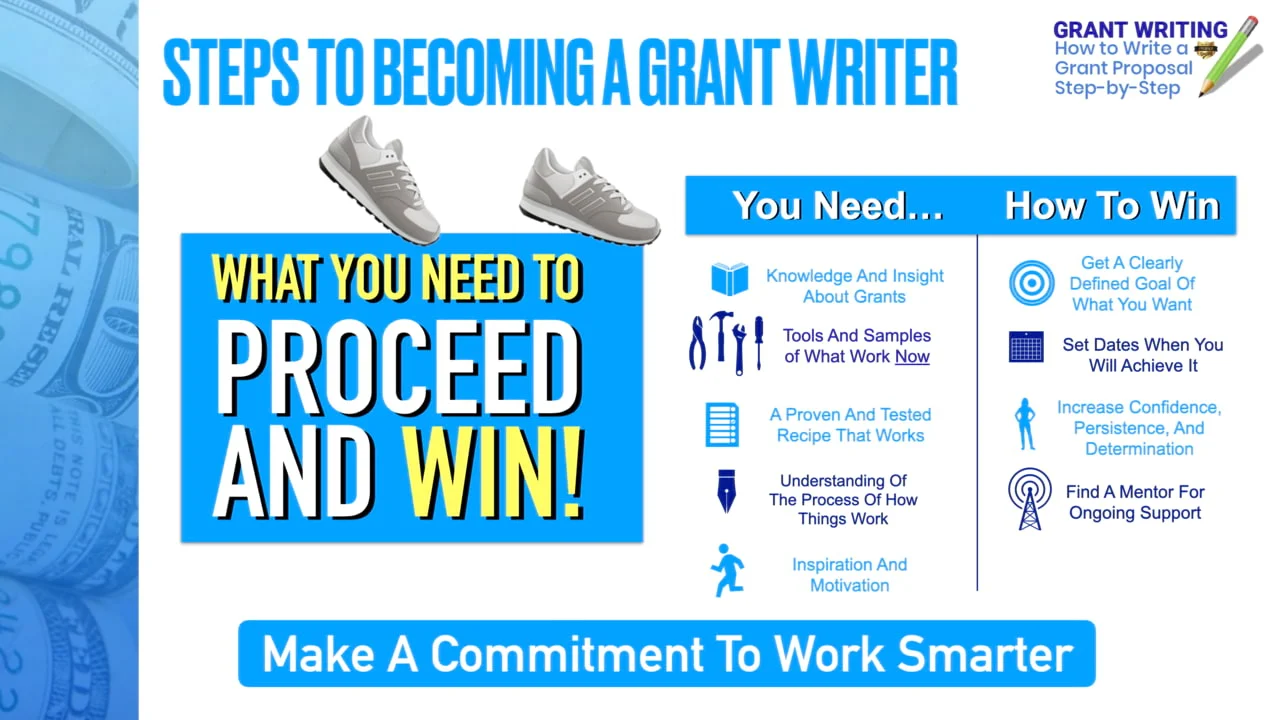
Now, I would encourage you to make a commitment to work SMARTer. When you do that, here are some steps they're going to help you. And the first thing I want to encourage you to do is to determine your time frame for a quantifiable knowledge required to learn in grant writing. You've already made an investment today to learn some of the basics, some of the fundamentals.
But here's what I want to also encourage you to do. Do you have a 12month strategy? Or do you have a 3month strategy to learn this skill? Or maybe a 6month strategy? Or maybe a one-month strategy?
Right now, I want to encourage you to think about what your strategy is and what is your game plan for learning this knowledge. Set a date right now, if you want to learn in a month, get a game plan to do that. If you're interested in learning the next 2-3 months, get a strategy for that and on and on. The bottom line is you have got to put some feet in the game and take the necessary steps right now.
With that being said, my friend, I want to see you win grants and I want to see your grant writing career win. We've been able to help a number of people to do that at a very high level. Literally, all across this nation, just like Wendell, who we have to increase his success rate. And just like Catherine, who knew zero about grant writing, but within six months took some of our strategies and started winning. And just like Evelyn, this librarian who learned how to write grant proposals. Getting the right information and the strategies and then won twenty-five thousand dollars. Or like Kjeld, who did four million dollars with his team.
With that being said, if you want to see other case studies and hear firsthand how these and others have done it, go over to wowtheydidit.com. And I want to show you some people that you're going to see once you go over there. Many of these people here have gotten funded. "But why and how did they go by getting funded Rodney?" Well, they did it because here's the statement that is worth noting from Zig Ziglar.
He says, "You don't have to be great to get started, but you have to start to be great." The people that you see on this page have raised collectedly over a hundred million dollars. But guess what? They all started out exactly where you are.
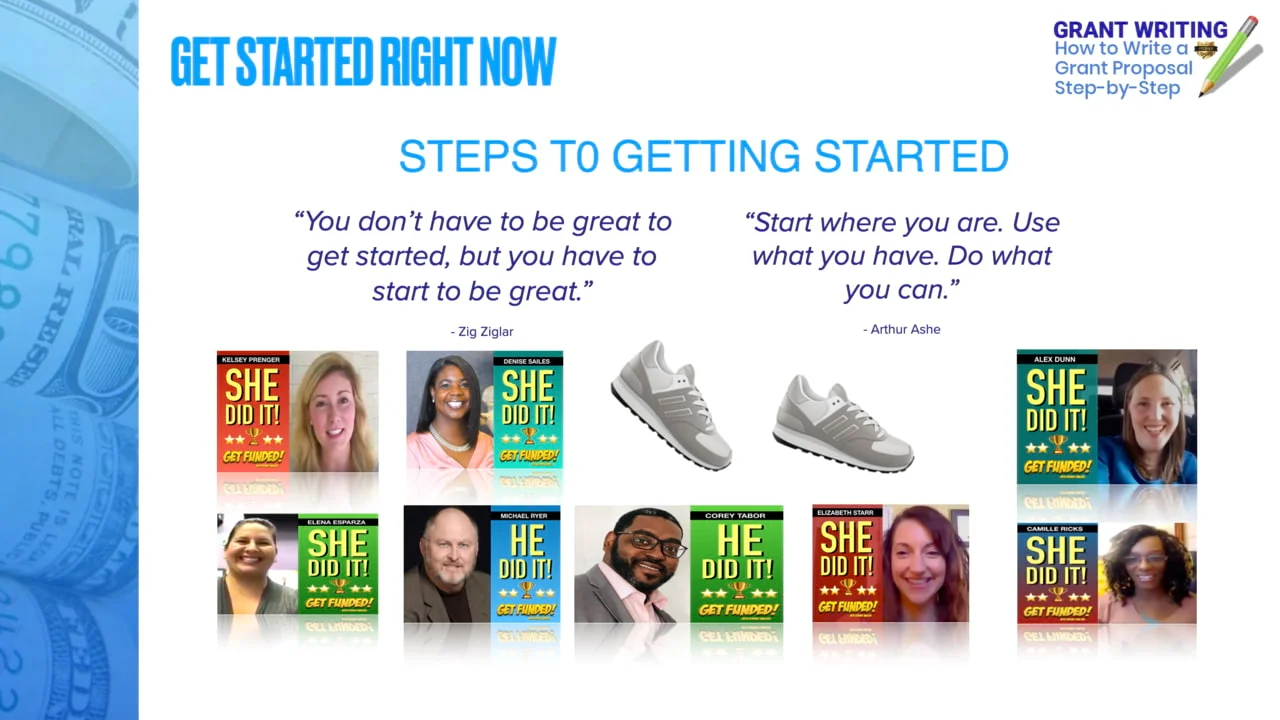
They didn't know a thing about grant writing when they first start. So what happens? We have to do what Arthur Ashe says, "You've got to start where you are, use you have, and do what you can." That means again my friend... taking action.
Go over to wowtheydidit.com and hear some of their stories. I believe that it will inspire you on your journey to writing grants as well. And I want to share with you a free resource that I have for you that's of an eight hundred dollar money-making value that will help you. This whole system here that you see is an incredible free gift that I like to put in your hands. Just go over to myincrediblefreegift.com. And when you're there, you'll notice that there are two videos. Watch the entirety of both those videos because there are some samples that they're going to show you that are in-house that's going to help you to be able to get funded.
And these samples are in our Get Funded Inner Circle. The Get Funded Inner Circle is going to help you. And maybe you say Rodney, "Hey I need more than just a system of information. I need some ongoing coaching, some one-on-one coaching, or maybe some group coaching." I want to encourage you to go over to grantwritingcoaching.com. And when you do so, look me up and I'm going to help you. Help you to win just like so many others.
I want to thank you for your time on today and thank you for sharing some of your time to learn about grant writing. I know that you're looking to do something special. And I hope that you will go out and make this world a better place.
Remember to follow me on Twitter, YouTube, Facebook, and Instagram. And if you'd like to subscribe, make sure that you hit that ring button over and getfundedwithrodney.com. If you are interested in talking to me and my team, remember, you can schedule a time at BookRodney.com and either myself or one of our grant coaches will help to point you in the right direction.
Again, have a great day. Happy grant writing and go make something happen. Be brave, bold, be brilliant, and take charge.
Rodney Walker is today’s leading expert in Grant Development Systems™ and President of Grant Central USA - Grant Writers Association. Learn more about his online grant writing courses today.







